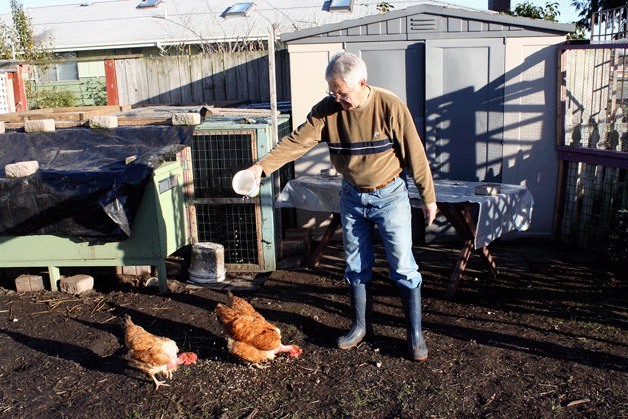Oak Harbor leaders are contemplating changing city code to allow backyard chickens after a former councilman’s fowl purchase left him with a little bit of egg on his face.
Raising backyard chickens is increasing in popularity across the country as many cities and towns have adopted rules that allow people to have small coops of hens. Oak Harbor is surrounded by communities that have adopted the pro-chicken rules; they include Coupeville, Anacortes, Mount Vernon and even Seattle.
The popular website, www.backyardchickens.com, describes the benefits of raising urban chickens. Chickens are described as interesting and humorous pets that produce fresh, healthy eggs for the refrigerator and great compost for the garden while eating all the creepy-crawlies in the lawn.
Many people build or purchase special portable coops for small flocks that can be moved around the yard to fresh grass.
Larry Eaton, who’s also a former high school teacher, decided to raise chickens and ducks in his backyard in order to teach his grandchildren to love and respect animals. He also wanted his family to have organic eggs from chickens he knows live a good life.
In addition, he admits that the fuzzy little chicks and ducklings are so darn cute.
While he’s advocating for the rule change to allow city chickens, Eaton also cautions people to educate themselves before rushing out and buying them.
“Prepare. Prepare. Prepare,” he said. “A lot of fun is taken out of it if you don’t prepare.”
Eaton studied Oak Harbor city code and couldn’t find any restrictions on raising fowl, so he went ahead and purchased 10 chicks and five ducklings at the Skagit Farmers Supply last spring. He said the employees were also under the impression that it was OK to raise chickens and ducks within the city.
Eaton built giant coops and went about raising the birds, learning a few lessons along the way. Then one day the city’s animal control officer showed up at his door, letting him know that he was running afoul of the law by keeping the flock. Eaton ended up calling the city’s planning director in order to find the fowl ban in a hidden corner of city code.
Not wanting to break his grandchildren’s hearts, Eaton took his case to city council. He spoke during a public comment period, asking the council to consider following the example of other cities and changing the code to allow a limited number of chickens and possibly ducks in backyards. The council members readily agreed to consider the request and will brood over the issue during a meeting in March.
Eaton suggested that Oak Harbor could look to the ordinance passed in Coupeville in 2011. It allows residents to have up to six hens.
Coupeville Mayor Nancy Conard said she knows four households that now raise chickens, but there could be more. She’s not aware of any chicken-related complaints, though there have been a couple of times when hens have gotten loose and had to be chased home by their owners.
“I’m not aware of any problems. I’m glad we were able to allow people the opportunity to raise chickens in their backyards,” Conard said. She said she prefers not to have chickens, but gets her eggs at the farmers market.
In Oak Harbor, Eaton admits that he overdid things by getting 10 chickens and five ducks.
He suggests that a maximum of six birds should be allowed in a lot. He also concedes that he wasn’t ready when he took on the responsibility and underestimated the cost. He didn’t start building the large coops and even larger fenced runs until after bringing the babies home. He used recycled materials, but still the costs weren’t exactly chicken feed.
“I estimated that my first egg cost me $1,000,” he said.
Two of the baby hens turned out to be roosters, so he gave them away to a farmer. Three of the ducks turned out to be drakes, so he had to build another enclosure to separate the sexes.
While his family enjoyed the larger eggs that the ducks provided, they didn’t like all the noise they make early in the morning.
“The female ducks that make all the noise,” Eaton said. “They’re loud. Oh, they’re loud.”
As a result, the ducks were also sent away to a country home. They are now “practice ducks” for an Australian herding dog in training.
There’s also predators to consider. Even though he lives in the middle of the city, he lost one of the ducks to a nighttime visitor — most likely a raccoon. Neighborhood dogs and cats may also like the taste of chicken.
For now, Eaton’s chickens are living the life of luxury in the middle of the city. He allows the birds to “free range” in his large backyard during the day and hustles them into secure, giant-sized coops at night. They only eat organic chicken feed and what they can forage in the yard. And people dote on them.



